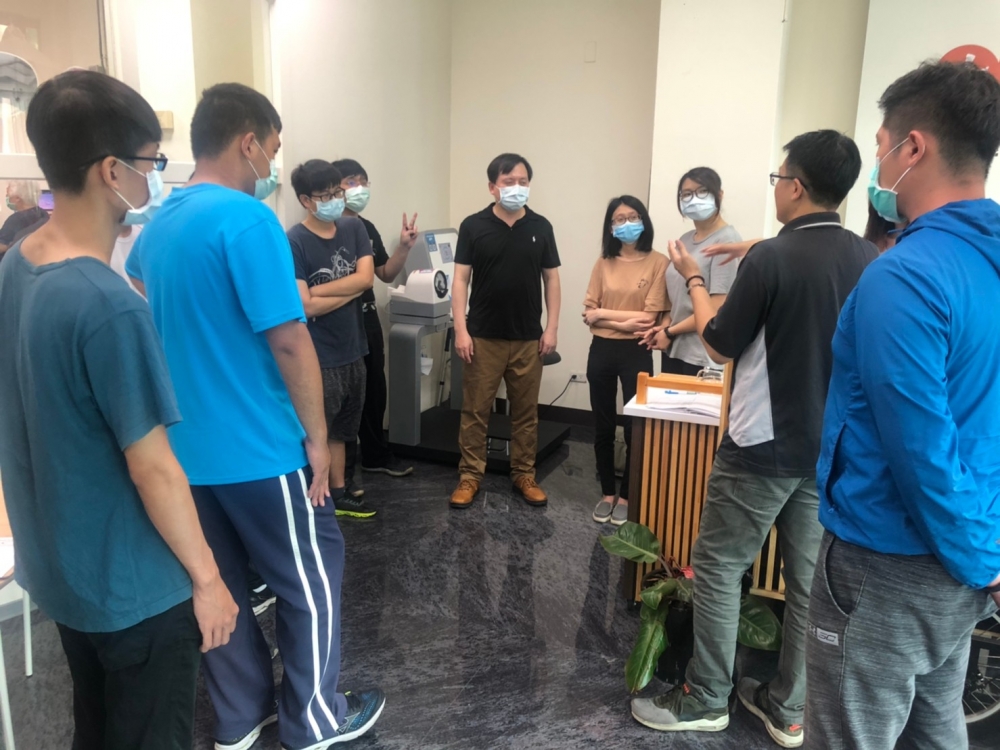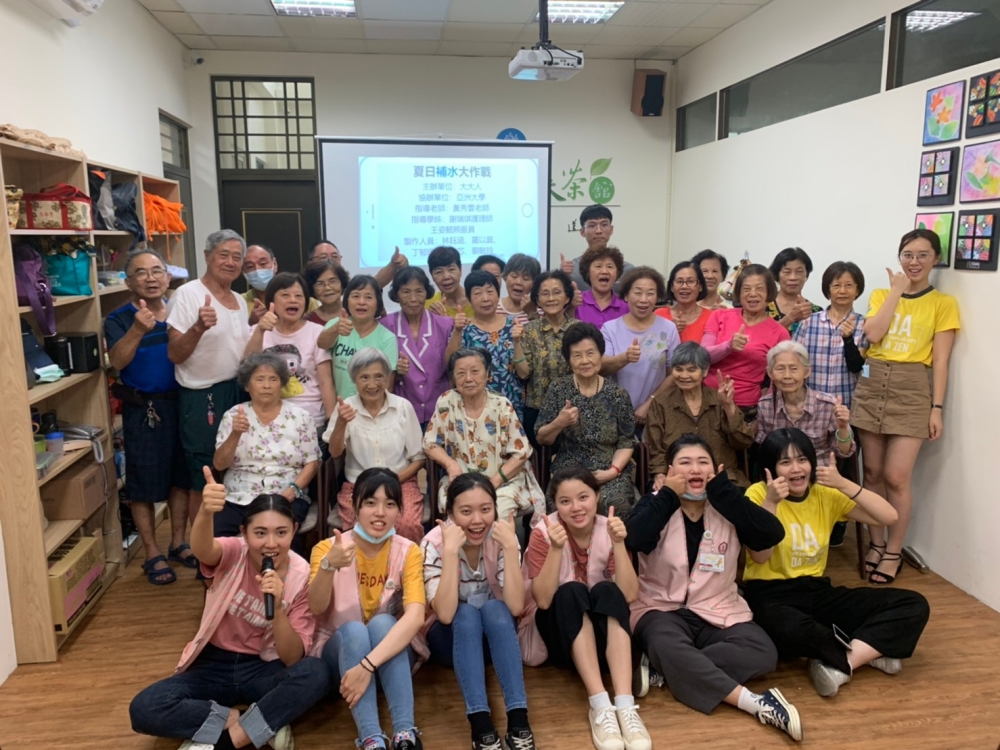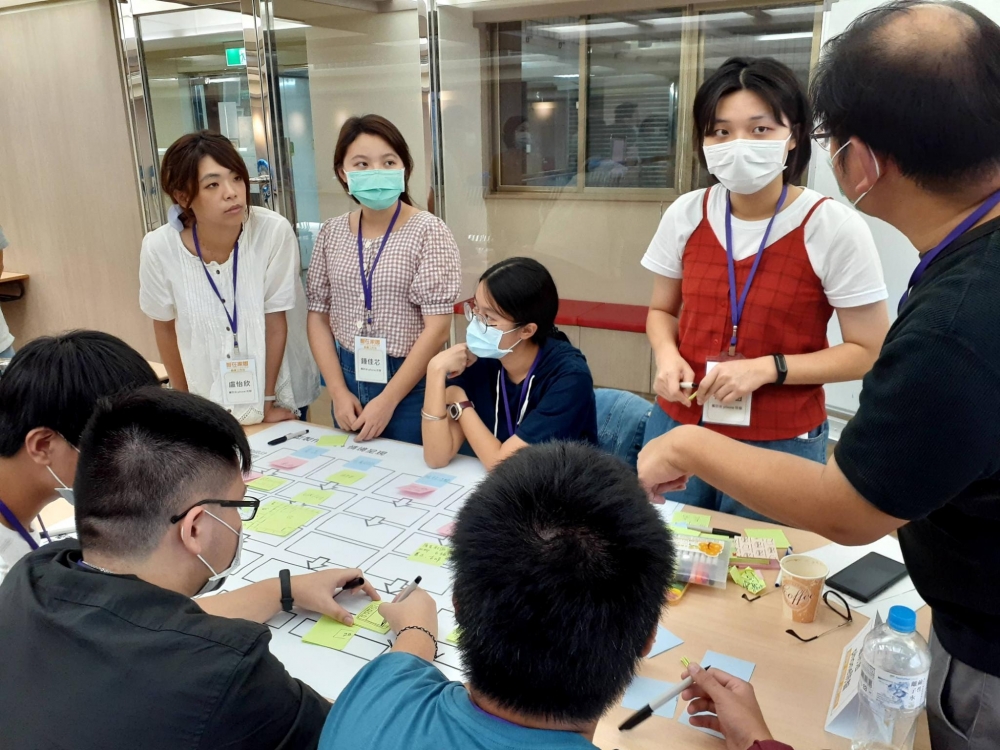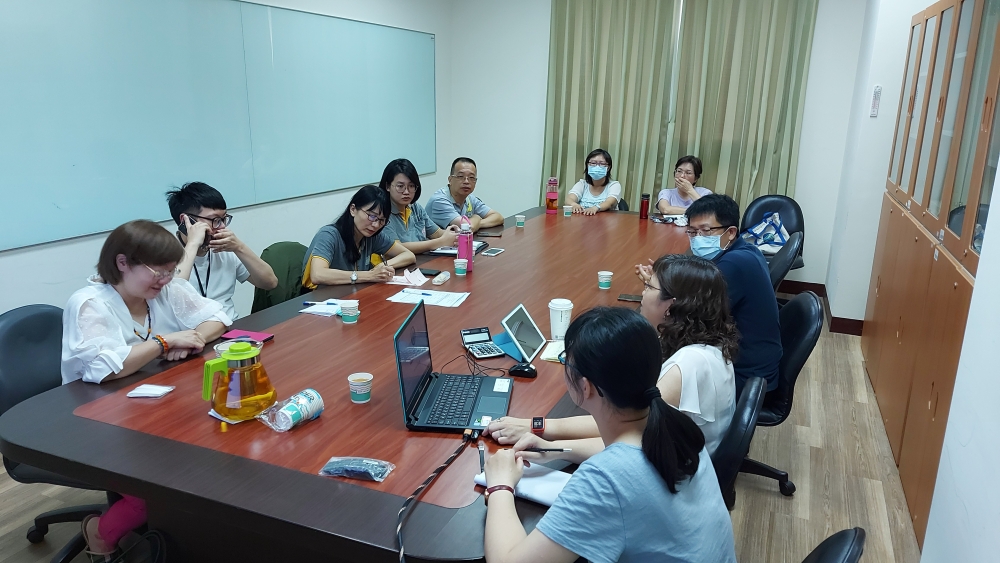The dementia-friendly dandelion seeds, fluttering in the wind like stars, deeply plough Ataabu everywhere!
For teachers and students in Asia University, "Ataabu" is like our second hometown. The local population living on this land is only 65,148. It is the smallest population in the Tun District of Taichung City. The young and elderly population accounts for nearly 28%. The aging index is increasing year by year up to 130%, indicating that the elderly population in Wu-Feng is much larger than the young population. As age is older, the prevalence of dementia is higher. There is also a gradual increase in dementia elders in all district of Wu-Feng. People generally misunderstand or do not understand dementia. In order to enable our elders to live in Wu-Feng healthy and settle down and to take care of themselves autonomously, "Prevention and Delay of Dementia" and "Friendly Dementia" are health promotion and long-term care issues that Asia University and Wu-Feng must join hands in. Under the cooperation of teachers and students in various inter-professional fields such as nursing, medicine and health, informatics, humanity, social work and the local industries, the first phase of "Avoiding Dementia Innovation and Integrated Care Action Plan (seed type)" and the second phase of "Creating a Dementia-Friendly Community for the Elderly Project (Sprout Type)" have been practiced through a problem/project-based learning loop to promote more than 30 courses with features of teaching innovation and local connection. After more than three years of intensive cultivation, teachers and students deeply practiced in the community for health creation of Wu-Feng to devote ourselves.
I still remembered when our USR team enters the Wu-Feng community for the first time, the elders thought that we were here to lead singing and doing handicrafts, and demonstrated lack of interest, and even late. Now we have formed a partnership with our local elders. Every time, the elders enthusiastically participated in our activities, even people from Dali and Feng-yuan across the districts called to express their willingness to participate and cooperate. Our Grandma Chen said, "When I get old, I am very afraid of dementia. Being a patient with dementia one day would increase the burden on my children. Now we know what to do to prevent dementia. More activities like this would be helpful to us!" Volunteer Mama Lin also said, "...the elderly was lack of interest in all activities of communities before. Since you came, the more elders like to come out and do activities. In addition to giving the elders opportunities to make friends, it can also reassure the family!" The 81-year-old grandma Wang also echoed, "we were from the next community. I heard that the game is very fun, so we come here together to play. The more we play, the best we feel! Some activities like doing handicrafts were felt nothing... This kind of activity of "opening wisdom" should be more!". I deeply feel the local enthusiasm and needed.
The Asia University USR project is to help Wu-Feng achieve a sustainable, prompting wisdom and dementia-friendly life. We practice (1) potential dementia assessment and tracking plan, and then refer suspected cases to be diagnosed; (2) dementia literacy rooted in an education plan to deliver dementia-friendly knowledge; (3) Cognition upgrade service plan to develop the Mediterranean meals, board games, nursing farms, aerobic dancing, stress-relieving workshops, music and garden therapy and so on for enriching the elderly and dementia-friendly services; (4) Smart assistance plans for dementia-friendly families to develop the digitization of case management and home services, "Let's play App" and aerobic exercise augmented reality; So far, about 150 activities have been held, and then 4,700 local people and 1,300 teachers and students participated in these activities. Students have grown in "being sensitive to the degeneration and needs of the elders", "improving the practical ability to handle activities for the elders", "planning ability to dementia prevention projects", "improving interaction with the elders" and "strengthening the ability to apply professional knowledge and skills".
Listening to students' feedback is the driving force for teachers to move forward. Student Xiao-hui said that she never imagined one day she could get into the local Wu-Feng community and interact with the elders, and through field inspections, she learned about the story of the land of Wu-Feng; She was impressed that developing dementia-friendly materials with different features in the "Introduction to Long-term Care" course, and practicing dementia-friendly health education projects in National Dali junior and senior high school. In the moment of seeing the high school students focused and eagerly asking questions, her heart was touched and felt that this is "the power of knowledge", and the knowledge we learned can be applied! Watching the students' step by step grow, they are the dandelion seeds, fluttering in the wind like stars, and deeply ploughing Wu-Feng everywhere, and then demonstrate the spirit of university social practice.
-
University characteristic Startup Stage Project
-
Taichung City
-
Asia University
Further reading
Measures for Leaving a Message to Enter the Draw for the Live Streaming of the Opening Ceremony
-
Event Period
From 13:00 to 14:00 on December 12 (Saturday), 2020
-
Event Measures
Log in to your personal Facebook or Google account to proceed with leaving a message; each account with a successful message of #2020usrexpo left before the end of the live streaming of the opening ceremony will have an opportunity to enter the draw, and each account is restricted to winning the prize once only.
-
List of Winners
On December 14 (Monday), 2020, the list of winners will be announced on the event official website https://2020usrexpo.org/) Announcement of the list of winners
Event Prize Content
-
1st Prize
“Huei Yeh” Power Extreme Massage Gun 1 winner
-
2nd Prize
Nestle Dolce Gusto Genio 2 1 winner
-
3rd Prize
KINYO Bluetooth 5.0 Wireless Speaker 2 winner
-
4th Prize
7-11 Gift Voucher valued at NT$200 27 winner
Announcement of the list of winners
The various prizes are expected to be notified via email and also announced on the event official website on December 14 (Monday), please will the prize winners pay attention to the prize-winning information, and send back the relevant documents according to the notices & explanations; no separate notification will be issued.
Notices
- The event period for this event is based on Taiwan time, and the delivery of the rewards is restricted to regions including Taiwan, Penghu, Kinmen, and Matsu.
- Please refer to the actual products for the event rewards, the pictures used on the website are for reference only; no request for changing colors, specs, transfers, or cash redemption will be accepted.
- Our event organizer will not be liable for the follow-up warranty and maintenance of the winning rewards; once the rewards have been collected, signed, and accepted, no reissuance of the rewards will be available if the rewards have been lost, peculated, discarded, or damaged. Please refer to the actual products for the prize rewards, no return or exchange will be accepted; the prize winner must contact the manufacturer of the rewards if there is any issue regarding malfunctioning, damage, or maintenance.
- 1st prize ~ 2nd prize (Winning prizes with a value exceeding NT$1,000 (inclusive): Each prize winner should fill out the “Reward Collection Application and Receipt (will be announced together with the announcement of the list of winners)” within 7 days (including holidays based on the post stamp) starting from the next day with the announcement of the list of winners, and must provide a copy of both sides of the ID card. The copy must be sent to the specified place via registered mail; those passing the deadline will be deemed to give up the prize and rights, and no objections will be accepted from the prize winners.
- 3rd Prize ~ 4th Prize (Winning prizes with a value less than NT$1,000 (inclusive): Prize winners should reply to the prize-winning notifying letter via Email within 7 days (including holidays) starting from the next day of the announcement of the list of winners, to confirm the collection of the rewards and to fill out the relevant info for sending the rewards (to confirm the address for sending the gift), and to accelerate the follow-up qualification review. If the prize winners do not complete the relevant info before the deadline, they will be deemed to give up the opportunity to collect the rewards, and no alternative gifts or reissuance of gifts will be available.
- When the prize winners have completed filling out the prize-winning info, the organizer will double-check the identification data of the prize winners, the rewards will only be sent out when all data is correct.
- All prize-winning qualification needs to be approved by the organizer before it becomes effective, all reviewing standards are based on the organizer as the only reference.
- If the prize winner did not fill in the data complete and correct, or cannot be in contact, or did not send back the required data within the announced time of the rewards, the prize winner will then be deemed to voluntarily give up the prize, no separate notification will be announced.
- According to the R.O.C Tax Act, if the prize winner is an individual residing in Taiwan, and the prize amount (value) exceeds NT$1,000 (inclusive), then a copy of both sides of the ID card will need to be handed in for taxation, which will be incorporated into individual income for the annual taxation. If the prize winner is not an individual residing in Taiwan, 20% of reward tax must be deducted from the reward first regardless of the prize amount before the prize winner can collect the reward. If the prize winner is not an adult, a household registration transcript must be provided along with a letter of consent from the legal representative. If the prize winner is unwilling to pay the tax first, he/she will be deemed to give up the reward, and no objections will be accepted.
- If the prize winner is in violation of the relevant event measures or has other dissents, the organizer is allowed to retrieve the reward and no objections from the prize winner will be accepted. If a judicial dispute is involved, all legal liabilities will be held by the individual. The organizer will not be liable.
- If it is confirmed that the participant used a hacker program or other method that evidently violates the fairness of the event in an attempt to influence the event, the organizer is then allowed to disqualify the participant immediately or to cancel the prize-winning qualification. Compensation will be liable if a loss is caused for the organizer due to this.
- For reasons that the organizer are not liable for, including a computer, network, telephone, or technique issues resulting in the delay, loss, incorrect, unidentifiable, or damaged data uploaded by the participants, the organizer will not be liable for any legal liability, and no objections from the participants and prize winners will be accepted.
- The organizer reserves the rights to review the qualification of the event participants, if the organizer or a third party has reported that the participants are found to use methods that are intentional or evidently violate the fairness of the event, or do not conform to the rules of this event, the organizer will then be allowed to cancel the prize immediately.
- The event measures are stated on the event platform, the organizer reserves the right to alter the event details at any time (participating method, gift content and quantity…etc.); the participants must agree completely to follow and obey the alterations of the event without any objection. Please refer to the announcement of the event measures if alternations have been made to the event measures, no separate notification will be available.
- Unmentioned matters of this event should be handled according to the relevant rules of the civil law; the organizer reserves the rights to maintain, modify, cease and explain the content, as well as to cancel the prize-winning qualification of any prize winner influencing other prize winners’ rights. Refer to the announcement on the platform for the modification info; no separate notification will be available.
- Participants in the event agree to accept the event measures and notices, if, in violation, the organizer will then be allowed to cancel the qualification of the participant or the prize winner, and then request the participant for compensation for the losses caused.
- When the event is unable to be conducted due to force majeure causes, the organizer has the rights to cancel, terminate, modify, or cease the event. Participants in the event are deemed to accept the effectiveness of the rules, for unmentioned matters, the organizer reserves the rights to modify, terminate, and alter the event content details without giving out a separate notification.
TOP










